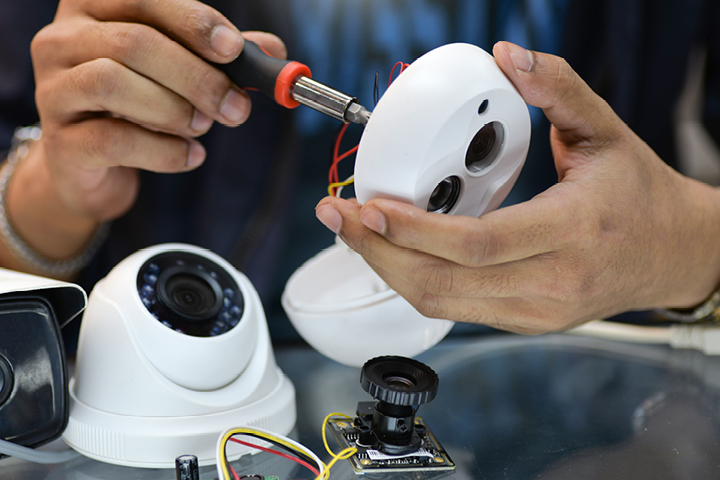Skip to main content
Start quiz
- Go to homepage
- Course areas
- Electrotechnology
- Certificate III in Security Equipment
Back to:Electrotechnology

Overview
About this course
Use your technical problem-solving skills to work as a large security systems installer in the dynamic security industry. Learn to set up large and wireless security systems and provide your community with a sense of safety.
This course is superseded. You can still enrol in this course, and you will be contacted if you need to transition into the next version when it is available.
Outcomes
What you'll gain
Learning outcomes
Through a mixture of theory and practical course work, learn to:
Solve problems in circuits
Use engineering drawings
Assemble, set up and install large security systems
Install and test wired and wireless security systems
Safely use hand and power tools
Apply occupational health and safety regulations, codes and practices in the workplace
Course outcomes
Learn core skills that prepare you for opportunities in your chosen field.
A nationally accredited qualification at Certificate III level
Exposure to the industry through simulated workplace environments
Experience using industry standard hand and power tools
Skills to install and test wireless and wired security systems
A strong pathway to continue your study and enhance your career opportunities
Suitability
Is this course right for you?
Entry requirements
This course requires evidence of previous experience or study before you can enrol.
Apprenticeship
Be employed as an apprentice in the industry
Register with an Apprenticeship Connect Australia Provider (ACAP) who will support your application
Non-apprenticeship
Non-apprenticeship pathways for trade-related qualifications allow you to have your industry skills assessed through recognition of prior learning (RPL) and undertake gap training to gain a trade qualification. To take this course as a non-apprenticeship, you must:
Be at least 21 years of age, as evidenced by photo identification
Have at least 2 years of work experience in this occupation or trade, as evidenced by employee records such as your resume and/or letters from your employers
Be currently employed in the relevant industry, as evidenced by a letter from your employer
Completion requirements
During your study you'll need to provide your teacher with the following evidence:
Entry recommendations
To be prepared for this course, we recommend that you have:
A desire to learn using hand tools
Good hand-eye coordination
The ability and desire to solve technical problems
An interest in and aptitude for technical work
The ability to follow instructions
Language, Literacy and Numeracy (LLN) at a Year 10 high school level
TAFE NSW may ask you to complete a Language, Literacy and Numeracy (LLN) skills test.
This skills test helps us to understand your individual study needs, to design an individualised plan that supports your study success and ensures your LLN skills match the demands of the course.
We tailor our courses to meet local community needs, so some campuses may have extra entry requirements. Check your preferred location for details. Need help preparing? Contact us for support.
Find Your Fit
This simple tool guides you to a suitable course level based on your foundation skills and confidence.
Pathways
Future career and study options
Career pathways
Our graduates go onto roles like:
Electronic Equipment Trades Worker
Electronic Equipment Trades Workers install, maintain and repair electronic equipment and systems such as audio and visual reproduction equipment, home entertainment systems, computers and electronic security systems.
Full-time share Full-time workers usually work 35 hours or more a week (in all their jobs combined).
86%
Employment size Employment size is the number of workers who do this as their main job.
7,500 workers
Average age This is the average age of all workers in this job.
41 years
Weekly pay Median earnings are shown for full-time, non-managerial employees paid at the adult rate, before tax or any amounts that are salary sacrificed. These figures are a guide to earnings only and should not be used to determine a wage rate.
$1,200
Average full-time The average full-time hours that people in this role work each week.
43 hours
Skill level rating Skill level ratings are based on the range and complexity of job roles. In general, the higher the skill level, the more formal education and training, previous experience or on-the-job training needed to be good at the job.
Medium
Gender share
4% female
Future growth The Department of Employment, Skills, Small and Family Business estimates the likely change in number of workers in this role, or industry, over the next 5 years. Future growth is the likely percentage change compared to all other job roles.
Stable
Other jobs include: business equipment technician, customs electronics installations technician, electrical fitter, audio visual installation technician and electronics engineering technical officer.
Licensing
A Class 2 security licence, also known as a security operative licence, is required for workers who want to carry out security work in NSW. This licence allows you to work in a wide range of specialist fields in the security industry. Visit the NSW Police website for more information on applying for your Class 2 security licence.
Study pathways
Take your study further with other courses offered at TAFE NSW:
Previous study0 Courses
Begin here to gain experience and confidence in this study area.
The Certificate III in Security Equipment does not have any pre-requisite courses.
Further study3 Courses
Advance your skills to take your career to the next level
Related study2 Courses
Learn core skills that prepare you for opportunities in your chosen field.
Your experience counts
At TAFE NSW, we recognise your previous study and work experience. You can apply for recognition of prior learning or a credit transfer with any of our courses. If you're successful you'll get your qualification faster.
Units
Units taught in this course
Courses are made up of a combination of both core and specialty units. In the Certificate III in Security Equipment qualification, you’ll need to successfully complete 1060 Weighting points, including 640 core and 420 speciality units.
Please note, not all specialty units are offered at every TAFE NSW location. It is highly recommended that you check with your preferred campus for information about the specialty units offered at that location.
Core units - 13
Core units are central to the job outcomes of a particular industry or occupation. These are the units industry has agreed are essential to be capable and qualified at a particular study level.
Apply environmentally and sustainable procedures in the energy sectorUEERE0001
Troubleshoot resonance circuits in an electronic apparatusUEEEC0074
Assemble and set up basic security systemsUEEEC0003
Enter instructions and test wired and wireless security systemsUEEEC0027
- ... 4
TAFE NSW services
Facilities and support
TAFE NSW provides support services across all campus locations and online. Whatever your needs or circumstances, we have the people, resources, counselling and facilities to support you in focusing on your studies.
TAFE NSW Disability Support Service
TAFE NSW Language, Literacy and Numeracy (LLN) support
TAFE NSW Aboriginal Support; Learner support (ABE)
TAFE NSW Careers, Counselling and Pathways Service
TAFE NSW Libraries
Scholarship programs - be supported as you explore your talents and fulfil your potential
Read&Write literacy and study support software is available free for all TAFE NSW students to use while studying on campus and at home
LinkedIn Learning - an online resource which offers innovative courses and tutorials to improve your personal and professional skills
Student associations - get social with our student community
Study options